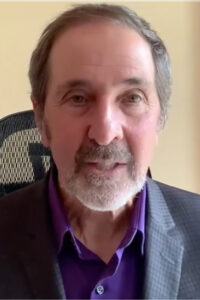
William H. Polonsky, PhD, CDE, ADA’s 2020 Outstanding Educator in Diabetes, told viewers who logged in for his award lecture during the Virtual 80th Scientific Sessions that he would attempt to discuss boredom without being boring.
“I’m not sure I can pull it off,” he said.
But based on comments from virtual attendees, not only did he pull it off, he inspired many to re-examine their Diabetes Self-Management Education and Support (DSMES) programs to improve efficacy.
During his talk, which he titled Tedious, Tiresome, and Dull: An Unrecognized Problem That We Can Solve, Dr. Polonsky reviewed evidence about poor DSMES attendance and provided strategies for educators looking to overcome the issue. The talk can be viewed by registered meeting attendees at ADA2020.org through September 10, 2020. If you haven’t registered for the Virtual 80th Scientific Sessions, register today to access all of the valuable meeting content.
Dr. Polonsky said it’s well-documented that group-based diabetes self-management education works. But evidence also shows that most newly diagnosed patients aren’t referred for DSMES, and those who are usually don’t complete the programs.
“In the real world, doctors don’t think it’s worth referring patients. They just don’t see the value,” said Dr. Polonsky, President and Co-founder of the Behavioral Diabetes Institute and Associate Clinical Professor in Psychiatry at the University of California, San Diego.
The data also show that when patients are referred for DSMES, few show up. And even if they show up, most drop out. Dr. Polonsky reviewed research on why that might be. Convenience and lack of time are most commonly cited as reasons patients stop attending, he said.
“If we make it more convenient, will that solve the problem?” he asked. “I’ve got to tell you, I don’t think so. ‘I’m too busy to return’ really means ‘your program isn’t that worthwhile.’ It’s time to face the truth. The problem is us. Our programs are boring.”
Dr. Polonsky said too many DSMES participants don’t feel engaged, which leads to boredom.
“We don’t mean to be boring,” he said. “But it happens when educators feel pressured to deliver too much information, when educators are fearful that too much interaction with participants will make it impossible to deliver the required information. We see it when educators are concerned that we won’t be able to answer participants’ questions.”
So what should diabetes educators do? Dr. Polonsky offered several strategies for improving engagement in DSMES programs.
First, he recommended reducing the content.
“This is probably the most painful,” he acknowledged. “But addressing participants’ concerns about their medications is more important than explaining how each class of medications work. The ability to estimate carbs or read food labels, which is a focus of a lot of programs, may be less important than helping participants to identify one dietary change they might make and understanding why that might be helpful and meaningful for them. And almost no one is interested in a biochemical explanation of how long-term complications develop or how hemoglobin becomes glycosylated.”
Dr. Polonsky also said programs must be personally meaningful for each participant. “We need to make room for the ‘why bothers.’ Try starting every class with a reminder and discussion about why we are here,” he advised. “On a white board, are we listing participants’ questions and confusions on the particular subject at hand? Every session should end with asking each participant to indicate what they think and what they might now try or do differently.”
Finally, educators need to admit there’s a problem, Dr. Polonsky said. He recommended educators track no-show and dropout rates, and survey dropouts about what was missing for them.
“Let’s refuse to be boring!” he said. “We educators can be cool. We are knowledgeable, innovative people. We don’t have to shove tons and tons of facts on patients. We can transform diabetes education.”
VIEW THIS PRESENTATION
Already registered?
View this presentation at ADA2020.org
Not yet registered?
Register now to access all presentations from the Virtual 80th Scientific Sessions